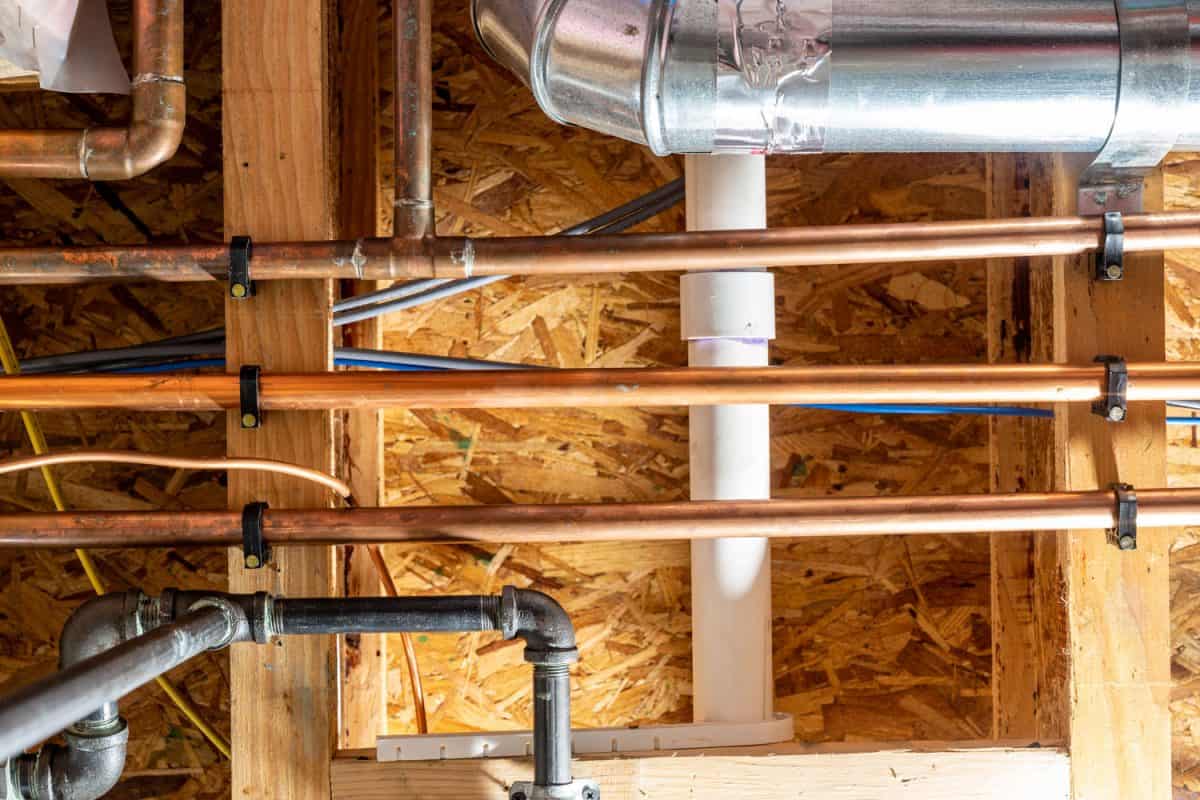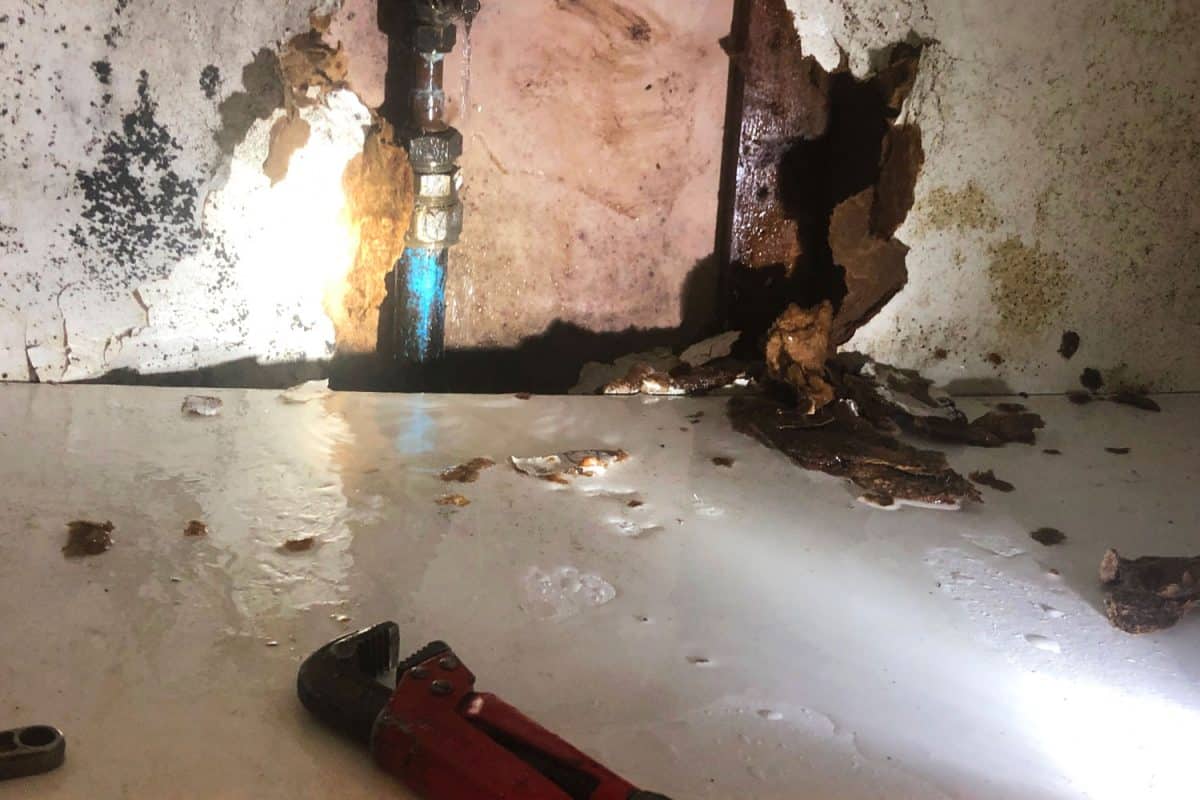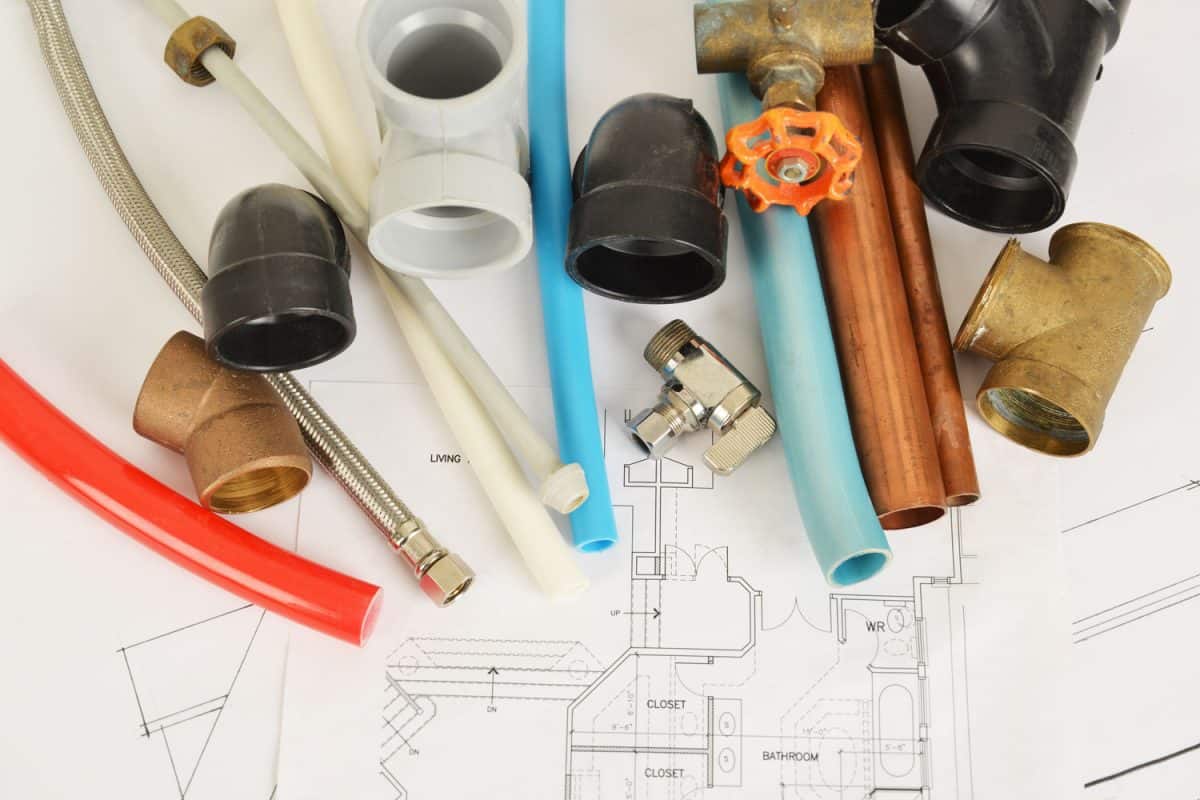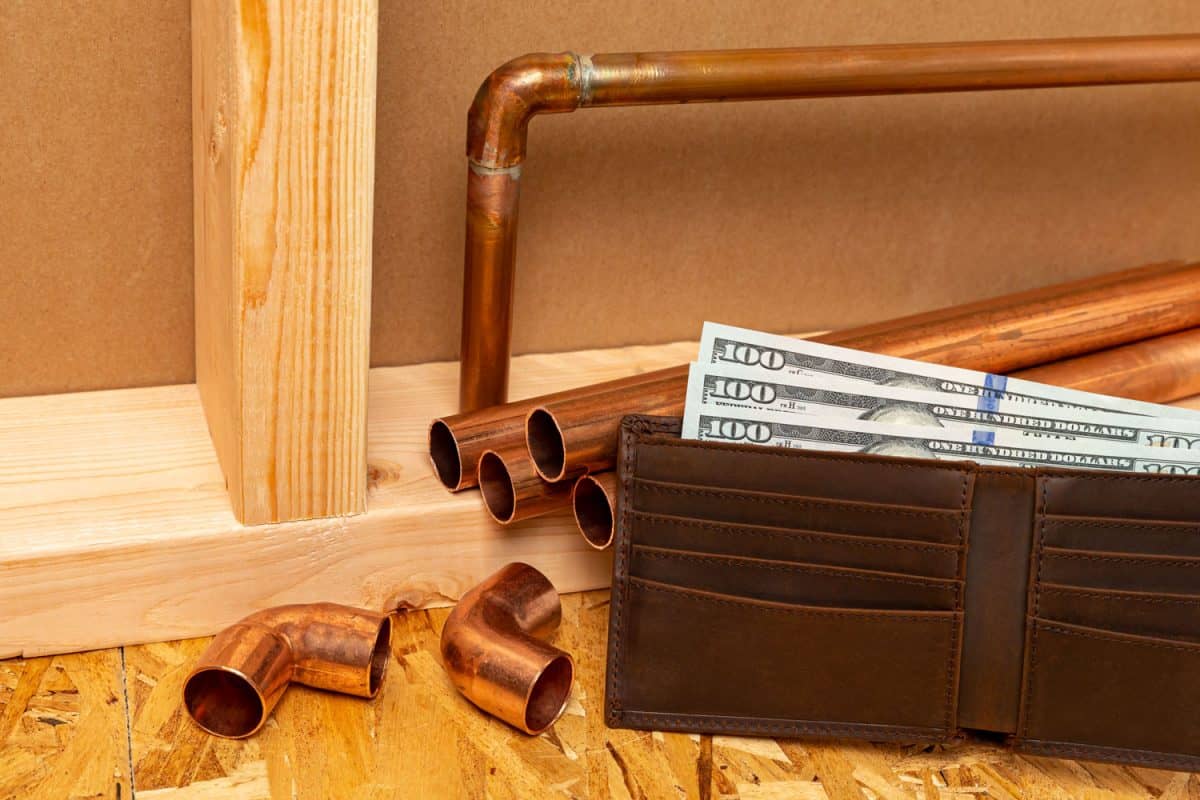The time will come when you need to have your pipes replaced. Of course, as a homeowner, you're concerned about how much re-piping will cost. That's what we asked expert plumbers this time, and here are the figures that they gave us.
The cost of copper pipe replacement depends on the size and number of stories in your house, how accessible the pipes are, the number of plumbing fixtures that will be installed, and the size of the copper pipes that you'll be using. On average, you will spend $3 to $8 per linear foot or a total cost of $8,000 to $16,000 if you'll be re-piping your house.
Keep reading so we can tell you more about the cost of re-piping your house and how to tell if your copper pipes need replacing already. We'll also discuss the life expectancy of these pipes and how to dispose of them properly. We'll also answer if plumbers still use copper pipes nowadays and give you the pros and cons of using copper and plastic pipes.

Cost of Re-piping a House
When your copper pipes are no longer fit to serve your plumbing needs, it would do you a lot of good to have them replaced rather than dealing with constant repairs. You also risk having bursting pipes that could lead to major damages to your home and property.
The bigger your house and more stories you have, you can expect to spend more on re-piping. The average cost is $3 to $8 per linear foot.

If the pipes are easily accessible, you would spend less on labor costs, unlike if the pipes are located inside small crawlspaces in your residence. Similarly, the bigger the diameter of the copper pipes and the more plumbing fixtures that need to be installed, the higher the cost.
All things considered, expect to spend between $8,000 and $16,000 for the replacement of your copper pipes. Yes, it is expensive, but it'll be worth it. It will increase the value of your home. You'll also be able to save on your water bill, and you'll be sure that the water in your home is safe, clean, and healthy.
How do you know when copper plumbing needs to be replaced?

Copper pipes are known for their durability but they do go bad over time especially when there's corrosion. This can be caused by substances present in your water, such as chlorine and chloramine. Too much water pressure and high water temperature can also lead to the failure of your copper plumbing.
There comes a point when the condition of the pipes can no longer be restored through repairs, and you would need to call your trusted plumber to have them replaced altogether. These are the signs that you should be looking out for.
- Cracks. These are easy to spot when the pipes are exposed. You will see water coming out along the pipelines. However, if the pipes are hidden behind the walls, you might notice that the wall or floor gets soaked with water.
- Leaks. Some leaks aren't obvious. There'll only be some drops of water, and it's easy enough to overlook the problem. But this is a sign that your copper pipes are in bad shape and might not be able to handle higher water pressure.
- Water discoloration. The water that's coming out from your faucet might be yellow, brown, green, orange, or blue. If your water doesn't clear up after a day, it might be a sign of metallic corrosion.
- Presence of sediment. Sometimes you'd see sediment floating in your water. This is also an indication of corrosion in your pipes.
- Metallic taste and smell. Corroded water pipes will leave a bad taste on your water, and you'll also notice that there's an unpleasant odor.
- Low water pressure. If you notice that the water pressure has decreased over the past few days, it might be your pipes' way of telling you that they're no longer fit to handle the pressure that you need.
These are just some of the telltale signs that your copper pipes need replacing. Contact your plumber immediately to avoid further damage.
How long do copper pipes last?
Copper pipes are said to be long-lasting and durable, but how long can you expect them to last? Experts say that their life expectancy would mostly depend on the type of copper pipe used. These are the three kinds of copper pipes based on their level of thickness:
Type M
This is the thinnest type of copper pipe and is the easiest to work with for your plumbing needs. However, they have the weakest walls and, therefore, offer the shortest life expectancy among all the types of copper pipes, which can be anywhere between 20 and 50 years.
Type L
Its walls are thicker than the M type, so you can also expect it to be more durable. It can withstand harsh weather conditions, acidic, and hard water. It comes with higher quality making it a great choice for homeowners. L Type copper pipes can last for 50 to 100 years.
Type K
This type has the thickest wall. This is mostly used for commercial and industrial plumbing because of its quality and because it's too expensive to use for residential purposes. It is expected to last longer than 100 years.
So, depending on the type of copper pipe used, you can expect it to last between 20 and 100 years or even more than that if the pipes are properly maintained.
Do plumbers still use copper pipes?
Plumbers still use copper pipes today. This type of pipe has been proven to be durable and long-lasting.
The continuous use of copper pipes in our plumbing systems also has a lot to do with familiarity. Since they have been used for residential water pipes for decades, plumbers have become experts in the use of these pipes, and when copper pipes get damaged, they already know how to do the repairs.
Up until the 2000s, copper pipes have been the leading choice when installing or replacing water pipes. However, with the advent of PEX plumbing tubes, copper pipes have become less popular.
PEX piping, or cross-linked polyethylene, is said to be revolutionary. It is a flexible form of plastic pipes that quickly earned the respect of plumbing experts because it is easy to work with, durable, and more affordable than copper pipes.
So, while plumbers still use copper pipes today, they now have another great option to use for water pipes with PEX unlike before when they dominated the market.
Is it better to use copper or plastic pipes?

It is important to make an informed decision when choosing the best material for your plumbing. Here are the pros and cons of copper and plastic water pipes.
Durability
Copper pipes are deemed to be more durable than plastic pipes. Copper has a life expectancy of 50 years or more, while some plastic pipes will only serve you for about 25 to 40 years. But when PEX plastic tubes are used, they can equal the life expectancy of copper.
Copper can withstand harsh weather conditions; that's why you can use them outdoors. Plastic pipes, however, are prone to damages caused by the sun's harmful UV rays, so they're not advisable to be used for your exposed pipes.
Plastic pipes do earn plus points for being resistant to acidic water and corrosion. They can also expand as the water expands when water freezes which is something that copper pipes cannot do; that's why they are more susceptible to bursting.
Flexibility
The more flexible a pipe is, the easier it is for plumbers to work with them. Plastic pipes are more flexible than copper pipes and are, therefore, easier to install.
The fittings for PEX tubes are also more convenient to put together than having to solder tube joints like what you have to do with copper pipes. There are fittings that can be connected without using any special tool. This also makes the process much safer because it eliminates a soldering iron or a torch.
Affordability
Plastic pipes are the more affordable material for your water pipes. One copper pipe is equal to three PEX tubes, so you can definitely save a lot when you use plastic pipes for your entire water system. Since installing plastic pipes is easier, the labor cost is also more affordable.
In the end, it all boils down to the homeowner's preference and budget. Copper pipes are still solid to use for your water pipes. Their strengths are their durability and ability to endure harmful UV rays.
But the good thing is that homeowners now have an equally great alternative, especially with the introduction of PEX piping in the market in recent years. The workaround here is to install the pipes in a place where there's minimal exposure to the sun so that they won't get damaged easily.
How do you dispose of copper pipes?
Since copper is a durable metal, you cannot just dispose of your copper pipes in the landfill. But the good news is that these pieces of metal can be recycled so that you can turn them into other useful items. Used copper pipes can be used to make huge statues, and they also have many electrical and commercial applications; that's why there's a high demand for this metal.
Contact your local recycling centers or private scrap metal companies. You might even get some cash out of it. But even if you don't get any money, you are helping preserve our environment.
If your copper pipes are still usable, you can donate them to charities or online communities that would need them. If you're feeling artistic and creative, you can turn them into a piece of art. You can use them to make conversation pieces in your house.
The bottom line is that your copper pipes can be recycled and turned into something useful even after their service in your water pipe system.
Final Thoughts

Spending $8,000 to $16,000 is a lot, but it's a worthwhile investment for your home. The good thing is that there are more affordable but equally great alternatives in the market that you can consider when repiping your home.
Visit the following posts for related reading:
How Long Do Copper Pipes Last And When To Replace Them?
Can You Mix PEX And Copper Pipes?
